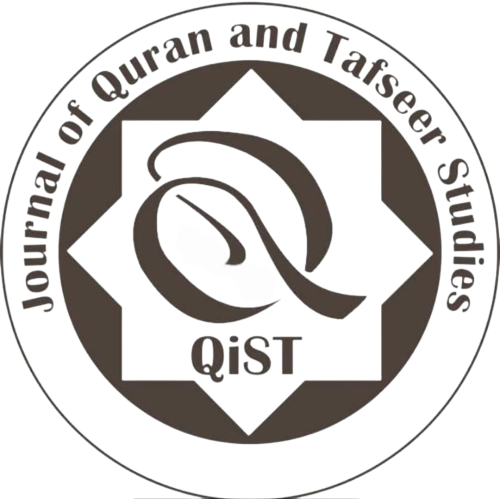THE CONCEPT OF SENSE IN THE QUR'AN: TAZAKKUR, NAZARA, AND TADABBUR AS THE BASIC HUMAN POTENTIAL TOWARDS A SUPERIOR HUMAN BEING
DOI:
https://doi.org/10.23917/qist.v2i1.1288Keywords:
Basic Human Potential, Superior Humans, Al-Qur'an PerspectiveAbstract
The position of reason is very important in human life, even the Qur'an also teaches humans to always use their minds correctly and well, so that with good reason, humans will be more noble, moral, moral, educated and valuable compared to other creatures. and benefit both himself and others. Therefore, it is necessary to know the concept of reason contained in the Qur'an, so that with these concepts it will be easier for humans to develop their basic potential to become superior human beings. This research is a type of literature study, the data sources in this study are divided into two, namely primary and secondary. This research is qualitative in nature, in data processing, the authors used descriptive qualitative data analysis techniques with an interpretive approach and with three data analysis methods, namely inductive, deductive, and comparative. The results of the research show that there are three concepts of reason that can be used as basic human potential to become a superior human being directly mentioned in the Qur'an, namely: 1) Tazakkur, 2) Nazara, and 3) Tadabbur. The three concepts of reason according to the Qur'an can be used as development of human potential, especially basic potential. However, there are other concepts of reason that can be used as the basic potential of humans to become superior humans, such as Tafaqquh, Tafakkur, Ta'aqqul, and Fahima. However, these concepts of reason are not mentioned too much repeatedly compared to the three concepts of reason mentioned in this study.
Downloads
References
Akhirin. "Pengembangan Potensi Anak Perspektif Pendidikan Islam." Tarbawi: Jurnal Pendidikan Islam 12, no. 2 (2015). https://doi.org/https://doi.org/10.34001/tarbawi.v12i2.515.
Arifin, M. Ilmu Pendidikan Islam; Tinjauan Teoritis Dan Praktis Berdasarkan Pendekatan Interdisipliner. Jakarta: Bumi Aksara, 2014.
Black, Antony. Pemikiran Politik Islam; Dari Masa Nabi Hingga Masa Kini. Jakarta: PT. Serambi Ilmu Semesta, 2006.
Connaway, L. S., and M. L. Radford. Research Methods in Library and Information Science. 7th ed. Amerika Serikat: ABC-CLIO, 2021.
Daradjat, Zakiah. Ilmu Pendidikan Islam. Jakarta: Bumi Aksara, 2011.
Fauzan, Muhammad Oceano, and Welly Yulianti. "Motivasi Belajar Untuk Membentuk Sumberdaya Manusia Unggul Pada Era Milenial." Jurnal Abdidas 3, no. 3 (2022): 590–98. https://doi.org/https://doi.org/10.31004/abdidas.v3i3.628.
Gafur, Abdul, and Israk. "Potensi Dasar Manusia Dan Aplikasinya Terhadap Pendidikan." Iqra: Jurnal Ilmu Kependidikan Dan Keislaman 13, no. 2 (2021): 35–39. https://doi.org/https://doi.org/10.56338/iqra.v13i2.298.
Ismail, Muhammad. "Konsep Berpikir Dalam Al-Qur'an Dan Implikasinya Terhadap Pendidikan Akhlak." Ta'dib: Jurnal Pendidikan Islam 19, no. 2 (2014): 291–312. https://doi.org/https://doi.org/https://doi.org/10.19109/td.v19i02.20.
Jalaluddin. Teologi Pendidikan. Jakarta: Raja Grafindo Persada, 2003.
Junaidi, Lukman. The Power of Wirid. Jakarta: Hikmah, 2007.
Kawulich, Barbara, Claire Wagner, and Mark Garner. Teaching Research Methods in the Social Sciences. Britania Raya: Taylor & Francis, 2016.
Mahfudzi. "Evaluasi Dan Solusi Konflik Menuju Integritas." Jurnal Alasma: Media Informasi Dan Komunikasi Ilmiah 2, no. 1 (2020): 83–100. https://jurnalstitmaa.org/alasma/article/view/35.
Mahmudah, Mila. "Tujuan Pendidikan Islam Dalam Mencetak SDM Unggul." Jurnal Keislaman 3, no. 2 (2020): 171–86. https://doi.org/https://doi.org/10.54298/jk.v3i2.3155.
Mardis, Marcia A., and Ruth V. Small. Research Methods for Librarians and Educators: Practical Applications in Formal and Informal Learning Environments. Amerika Serikat: ABC-CLIO, 2018.
Muhaimin. Arah Baru Pengembangan Islam, Pemberdayaan, Pengembangan, Kurikulum Hingga Redefinisi Islamisasi Ilmu Pengetahuan. Jakarta: Nuansa, 2003.
Mulkhan, Abdul Munir. Jalan Ketiga Relegios Indonesia. Yogyakarta: Impulse, 2007.
Pasya, Ahmad Fuad. Dimensi Sains Al-Qur'an, Menggali Ilmu Pengetahuan Dari Al-Qur'an. Solo: Tiga Serangkai, 2004.
Purwanto, M. Ngalim. Psikologi Pendidikan. Bandung: Remaja Rosdakarya, 2006.
Quthb, Sayyid. Tafsir Fidzilalil Qur'an. Jakarta: Gema Insani Press, 2008.
Rahardjo, M. Dawam. Ensiklopedi Al-Qur'an, Tafsir Sosial Berdasarkan Konsep-Konsep Kunci. Jakarta: Paramadina, 2002.
Rijaya, M. Happy With Zikir. Bandung: Mizan, 2006.
Sabari, Henry S. Menggugat Manusia Modern. Yogyakarta: Kanisius, 2008.
Sandimula, Nur Shadiq. "Konsep Epistemologi Akal Dalam Perspektif Islam." Potret Pemikiran 23, no. 1 (2019): 19–25. https://doi.org/http://dx.doi.org/10.30984/pp.v23i1.970.
Setiawan, M. Arif, and Malvien Zaenul Asyiqien. "Urgensi Akal Menurut Al Qur'an Dan Implikasinya Dalam Mencapai Tujuan Pendidikan Islam." Intelektual: Jurnal Pendidikan Dan Studi Keislaman 9, no. 1 (2019): 35–52. https://doi.org/https://doi.org/10.33367/ji.v9i01.965.
Shihab, M. Quraish. Logika Agama: Kedudukan Wahyu Dan Batas-Batas Akal Dalam Islam. Bandung: Lentera Hati, 2005.
Tasmara, Toto. Menuju Muslim Kaffah Menggali Potensi Diri. Jakarta: Gema Insani Press, 2000.
Thalib, Muh. Dahlan. "Konsep Iman, Akal Dan Wahyu Dalam Al-Qur'an." Al-Ishlah: Jurnal Pendidikan Islam 20, no. 1 (2022): 9–29. https://doi.org/https://doi.org/10.35905/alishlah.v20i1.2661.
Wildemuth, Barbara M. Applications of Social Research Methods to Questions in Information and Library Science. 2nd ed. Britania Raya: ABC-CLIO, 2016.
Wiyono, Slamet. Manajemen Potensi Diri. Jakarta: Grasindo, 2004.
Yunus, Firdaus M., Syamsul Rijal, and Taslim HM Yasin. "Konsep Akal Menurut Perspektif Al-Qur'an Dan Para Filsuf." Ar-Raniry: International Journal of Islamic Studies 7, no. 2 (2020): 56–69. https://doi.org/http://dx.doi.org/10.22373/jar.v7i2.10976.
Downloads
Submitted
Accepted
Published
How to Cite
Issue
Section
License
Copyright (c) 2022 Asrizal Saiin, Mohamad Karuok

This work is licensed under a Creative Commons Attribution 4.0 International License.














